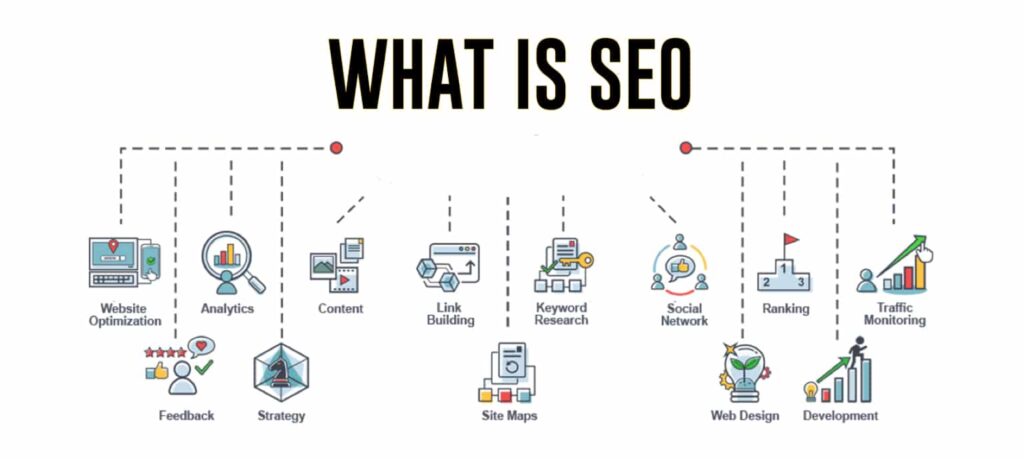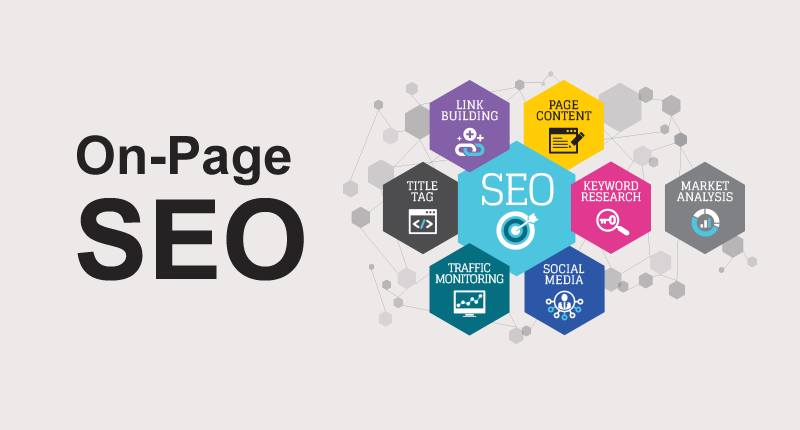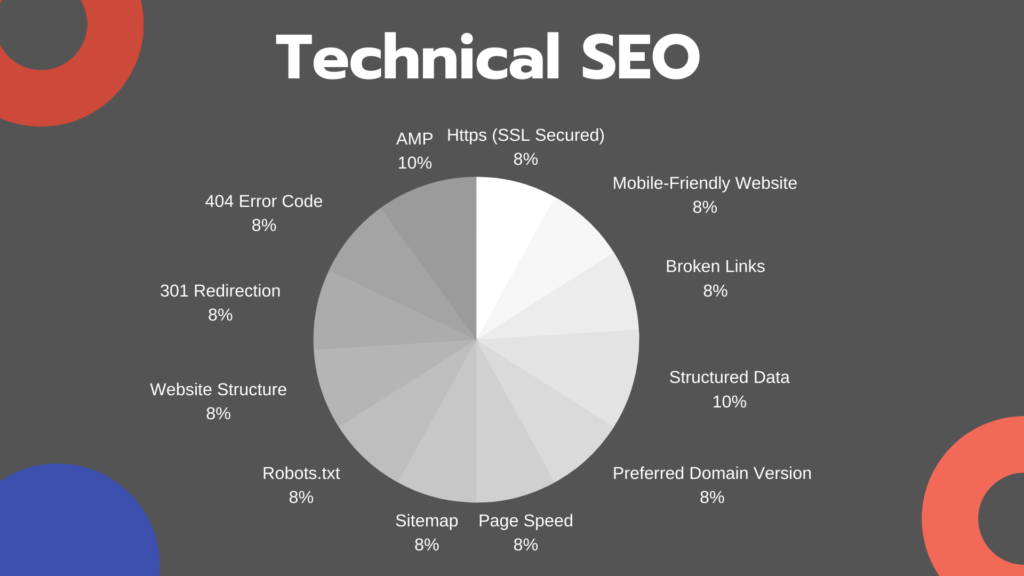Search Engine Optimization (SEO) is a critical component of modern digital marketing. If you’re looking to boost your website’s SEO ranking and attract more organic traffic, you need to understand the different aspects of SEO services. Whether you’re a small business or a large corporation, SEO optimisation can significantly impact your online presence.
At Sparkling Digital, we specialize in providing comprehensive SEO services, including on-page SEO, off-page SEO, and technical SEO. This article will walk you through these three critical areas to help you better understand how search engine optimization (SEO) works and how it can benefit your business.

What is SEO?
Before we dive into the specifics of on-page, off-page, and technical SEO, it’s essential to understand what SEO actually is.
Search Engine Optimization (SEO) refers to a set of strategies and techniques aimed at improving a website’s visibility on search engine results pages (SERPs). The goal is to increase the quantity and quality of organic (unpaid) traffic that comes to your site from search engines like Google, Bing, and Yahoo.
SEO involves optimizing your site for search engines while keeping user experience in mind. Good SEO practices make it easier for search engines to crawl, index, and rank your site, leading to higher visibility and more visitors.
Now, let’s explore the three core elements of SEO: on-page, off-page, and technical SEO services.
What Are SEO Services?
SEO services refer to the range of tasks that agencies like Sparkling Digital perform to improve a website’s search engine rankings. These services involve several aspects, from optimizing content to technical adjustments and off-site promotion. The ultimate goal is to improve a site’s SEO ranking, making it more visible in search engine results. There are three primary types of SEO services:
- On-page SEO
- Off-page SEO
- Technical SEO
Let’s break down each one of these in more detail.

On-Page SEO
On-page SEO refers to all the elements you can control directly on your website. This includes optimizing individual web pages to improve their ranking on search engines and attract more relevant traffic. On-page SEO focuses on both the content and the HTML source code of a page.
Key Components of On-Page SEO
- Keyword Research and Optimization
Keywords are the backbone of on-page SEO. Effective search optimization begins with understanding what terms people are using to search for your services. By using tools like Google Keyword Planner, SEMrush, or Ahrefs, you can identify high-traffic, low-competition keywords to incorporate into your content.
Once you have a list of keywords like “SEO services,” “search engine optimization (SEO),” and “SEO tools,” you can optimize your website content by naturally integrating these keywords into your titles, meta descriptions, headers, and body text.
1. Title Tags and Meta Descriptions
The title tag is an HTML element that specifies the title of a webpage. It’s important for SEO optimisation because it tells search engines what the page is about. A well-optimized title tag should include the primary keyword and be less than 60 characters long to ensure it’s displayed correctly on SERPs.
The meta description is another essential element for SEO. While it doesn’t directly impact SEO ranking, a well-written meta description can increase your click-through rate (CTR) by making your listing more appealing to searchers.
Example:
Title Tag: SEO Services 101: Improve Your Search Ranking with Sparkling Digital
Meta Description: Learn about on-page, off-page, and technical SEO services to boost your SEO ranking with Sparkling Digital.
2. Header Tags (H1, H2, H3)
Using proper header tags (H1, H2, H3) in your content helps structure your page, making it easier for search engines to understand the hierarchy of information. The H1 tag should contain your primary keyword, while the H2 and H3 tags can contain secondary and related keywords.
3. Content Quality
High-quality content is the foundation of successful on-page SEO. Search engines prioritize content that is informative, relevant, and engaging. By focusing on creating well-researched, original content that answers user queries, you’ll improve your SEO ranking.
Content should also be optimized with the right keywords, but avoid keyword stuffing, which can harm your rankings.
4. Internal Linking
Internal links help distribute “link juice” throughout your website, which can boost the SEO ranking of your pages. Linking to other relevant pages within your site not only helps with navigation but also assists search engines in understanding the structure and importance of various pages.
5. Image Optimization
Images are an essential part of a webpage, but they can slow down your website if not optimized correctly. To improve your SEO ranking, use relevant file names, alt text with your keywords, and compress image sizes without losing quality.
6. URL Structure
Clean and concise URLs help search engines understand what a page is about. Avoid using long, complex URLs, and instead, include your primary keyword in the URL to improve its SEO performance.
Example:
www.sparklingdigital.com/seo-services

Off-Page SEO
While on-page SEO deals with optimizing elements on your website, off-page SEO refers to actions taken outside of your website to improve its SEO ranking. This involves building backlinks, increasing brand awareness, and improving your site’s authority.
Key Components of Off-Page SEO
1. Backlink Building
Backlinks are one of the most important ranking factors for search engines. When high-authority websites link to your content, it signals to search engines that your website is trustworthy and valuable, which can significantly boost your SEO ranking.
At Sparkling Digital, we focus on building quality backlinks through guest blogging, influencer outreach, and partnerships with reputable websites. A strong backlink profile is crucial for any successful SEO campaign.
2. Social Media Marketing
Social media can play a role in off-page SEO. While social media links may not directly impact SEO rankings, they can increase brand awareness, drive traffic to your website, and generate backlinks. Sharing high-quality content on platforms like Facebook, LinkedIn, and Twitter can improve your overall search visibility.
3. Guest Posting
Publishing content on external websites in exchange for backlinks is a tried-and-true off-page SEO strategy. When you guest post on authoritative sites, you not only gain a backlink but also increase your brand’s visibility within your niche.
4. Influencer Outreach
Collaborating with influencers in your industry can generate exposure and drive traffic to your site. If influencers share or link to your content, it helps build your online presence and strengthen your off-page SEO.
5. Online Reviews and Mentions
Getting positive reviews on platforms like Google My Business, Yelp, and other industry-specific review sites can help improve your website’s authority. Additionally, mentions of your brand across different online platforms can serve as signals to search engines about your site’s relevance.

Technical SEO
Technical SEO involves optimizing the technical aspects of your website to ensure that search engines can crawl and index your site efficiently. It focuses on improving your site’s backend, which is crucial for improving your SEO ranking and overall user experience.
Key Components of Technical SEO
1. Site Speed Optimization
A fast-loading website is critical for SEO success. Slow websites not only frustrate users but also get penalized by search engines. Use tools like Google PageSpeed Insights to identify elements that are slowing down your website and optimize them accordingly. This can include compressing images, minifying code, and using browser caching.
2. Mobile-Friendliness
With more people browsing the web on mobile devices, having a mobile-friendly site is essential for both SEO and user experience. Google uses mobile-first indexing, meaning it primarily uses the mobile version of a site to determine its SEO ranking. Make sure your site is fully responsive and offers an excellent user experience on all devices.
3. XML Sitemaps
An XML sitemap helps search engines crawl your website more efficiently. It acts as a roadmap, showing search engines the structure of your site and which pages are the most important. Submit your XML sitemap to Google Search Console to ensure all your pages are indexed.
4. Secure Sockets Layer (SSL)
Having an SSL certificate is now a ranking factor for Google. Websites with SSL certificates have “https://” in their URLs, indicating that the site is secure. A secure website not only improves SEO ranking but also builds trust with users.
5. Canonical Tags
Duplicate content can confuse search engines, leading to lower rankings. Canonical tags help resolve this issue by telling search engines which version of a page is the original. Implementing canonical tags ensures that your content isn’t penalized for duplication.
6. Schema Markup
Schema markup is a type of microdata that helps search engines understand your content better and provide more informative results for users. By adding schema markup, you can enhance your listings with rich snippets, such as star ratings, product information, and event details.
7. Robots.txt File
A robots.txt file is a simple text file that instructs search engine crawlers on which pages to index and which to ignore. By optimizing your robots.txt file, you can ensure that search engines only focus on the most critical parts of your site.
8. Backlink Building
Backlinks are one of the most important ranking factors for search engines. When high-authority websites link to your content, it signals to search engines that your website is trustworthy and valuable, which can significantly boost your SEO ranking.
At Sparkling Digital, we focus on building quality backlinks through guest blogging, influencer outreach, and partnerships with reputable websites. A strong backlink profile is crucial for any successful SEO campaign.
9. Social Media Marketing
Social media can play a role in off-page SEO. While social media links may not directly impact SEO rankings, they can increase brand awareness, drive traffic to your website, and generate backlinks. Sharing high-quality content on platforms like Facebook, LinkedIn, and Twitter can improve your overall search visibility.
10. Guest Posting
Publishing content on external websites in exchange for backlinks is a tried-and-true off-page SEO strategy. When you guest post on authoritative sites, you not only gain a backlink but also increase your brand’s visibility within your niche.
11. Influencer Outreach
Collaborating with influencers in your industry can generate exposure and drive traffic to your site. If influencers share or link to your content, it helps build your online presence and strengthen your off-page SEO.
12. Online Reviews and Mentions
Getting positive reviews on platforms like Google My Business, Yelp, and other industry-specific review sites can help improve your website’s authority. Additionally, mentions of your brand across different online platforms can serve as signals to search engines about your site’s relevance.
SEO Tools to Improve Your Website
To implement effective SEO, you need the right tools to monitor performance and identify areas for improvement. Here are some popular SEO tools that Sparkling Digital uses:
- Google Analytics – Tracks website traffic, user behavior, and conversion rates.
- Google Search Console – Provides insights into how Google views your site, including indexing status and performance metrics.
- Ahrefs – Helps with keyword research, backlink analysis, and content gap identification.
- SEMrush – All-in-one SEO tool for keyword tracking, competitor analysis, and SEO audits.
- Moz – Offers various SEO tools for link building, keyword research, and site audits.
- Yoast SEO – WordPress plugin that helps with on-page SEO optimisation, including title tags, meta descriptions, and readability analysis.
Why Choose Sparkling Digital for SEO Services?
At Sparkling Digital, we understand that SEO is not a one-size-fits-all solution. We offer tailored SEO services that align with your business goals. Whether you need on-page SEO to optimize your content, off-page SEO to build your online reputation, or technical SEO to improve your site’s performance, our team has the expertise and tools to help.
Our approach combines search engine marketing and search optimization to deliver long-lasting results. By focusing on proven strategies, innovative SEO tools, and industry best practices, we help businesses achieve higher search engine rankings, increase website traffic, and drive more conversions.
Conclusion
SEO is an ever-evolving field that requires a deep understanding of various elements to be successful. By mastering on-page, off-page, and technical SEO, you can significantly improve your website’s SEO ranking and visibility on search engines.
Sparkling Digital offers comprehensive SEO services designed to meet your specific needs. Whether you’re looking to boost your local SEO, improve your site’s technical performance, or increase backlinks, we have the expertise to help. Contact us today to learn more about how we can help your business grow through effective search engine optimization (SEO).
